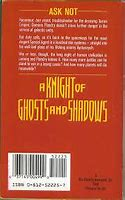A Knight Of Ghosts And Shadows.
I have probably quoted all of these examples before. They show the wind accompanying Poul Anderson's characters through the narrative as if commenting on the action.
When the ychani march to the Dennitzan Parliament:
"A west wind skirled against the sun, whose blaze seemed paled in a paled heaven." (XVII, p. 551)
Heaven pales as the crisis deepens.
When Flandry speculates about a Merseian agent meddling in Dennitzan affairs:
"The wind boomed between walls." (p. 555)
When Kossara Vymezal arrives unexpectedly to address the Shkoptsina (Parliament):
"A moan lifted out of the benched humans, as if the fall wind had made entry..." (p. 560)
This time, the wind outside is not heard but is present as a metaphor.
Finally, for now, when, after the attempted coup:
"Zorkagrad lay silent under bitter blue, as if killed..." (XVIII, p. 569)
- we are told that:
"Day broke windless and freezing cold." (ibid.)
What could be more appropriate than windlessness to accompany apparent death?

No comments:
Post a Comment